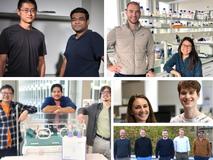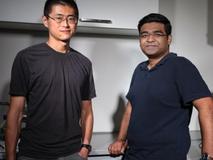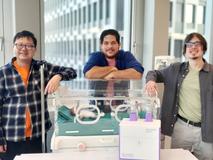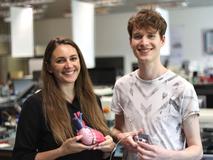Startups developing automated Aerosol InfraRed (AIR) Monitor, genome-engineered red cells, preterm glycemia controller, a novel heartbeat visualization, and an earth-timber floor slab each win CHF 10,000
12.06.2023
AeroSpec, Ariya Bio, Glucki.ch, Pace Locator, and Rematter win Venture Kick's first stage of financial and entrepreneurial support. Their projects perform the chemical composition analysis and the source signature analysis using a novel aerosol collector and infrared spectroscopy; develop a one-time CRISPR-Cas9 gene editing cell therapy that will increase beneficial hemoglobin and reduce all disease symptoms in Beta-hemoglobinopathy patients lifelong; bring the first non-invasive, continuous, reliable, and safe glucose sensor for clinical use in the neonatology unit; will bring security to approximately 3 million per year very- and extremely preterm infants at severe exposure to neonatal hypoglycemia; aim to improve the safety of cardiovascular disease treatment by overcoming limitations in state-of-the-art cardiac imaging technology; and combine the price and performance of reinforced concrete floors with unrivaled sustainability and room climate.
 |
 AeroSpec: CSO Satoshi Takahama & CEO Nikunj Dudani
|
 AriyaBio: CEO Mandy Boontanrart (right) & CSO Jan Nelis (left)
|
 Gluckli.ch: (From Left to right) COO Yun Ding, CEO Aldo Di Costanzo Mata, and CTO Oleksii Ustinov
|
 Pace Locator: CEO Emily Thompson & Hardware Software Engineer Bruno Stucki
|
 Rematter: (From left to right) Product Dev Tobias Huber, Board Member Nico Ros, Biz Dev Götz Hilber, Tec Dev Tobias Bonwetsch, and Sustainability Remo Thalmann
|
AeroSpec: Chemical composition & source analysis of aerosol air pollution
According to the WHO, air pollution is “the world’s largest single environmental health risk”. A key challenge lies in accurately measuring the different chemical components of aerosol air pollution, identifying emission sources, and understanding the potential health effects. Current methods, which are limited and focus on specific elements of pollution, are costly and require expert labor for operation and interpretation. This gap has created a pressing need for a comprehensive, automated monitoring tool.
AeroSpec’s automated Aerosol InfraRed (AIR) Monitor performs the chemical composition analysis and the source signature analysis using a novel aerosol collector and infrared spectroscopy. Additionally, it offers comprehensive and actionable information for data-driven policy-making. AeroSpec targets three primary markets: aerosol researchers, monitoring agencies, and various industries that need to measure emissions. Specifically, they aim to capture the 20% import fraction of the multi-billion-dollar air quality monitoring market, showing robust growth in emerging markets. Founders Dr. Nikunj Dudani, CEO, and Dr. Satoshi Takahama, Scientific Expert, are incubating AeroSpec at EPFL and plan to incorporate it soon.
With a pilot demonstration of the AIR Monitor scheduled for this year, AeroSpec is set to use the Venture Kick funds to conduct a broader customer feedback drive and to expand its team.
Ariya Bio: Genome-engineered red cells to cure blood disorders
Diseases that affect the structure and function of red blood cells are called Beta-Hemoglobinopathies, and they are the most common monogenetic diseases worldwide, with approximately 360 000 annual births with a serious form of the disease, and 7% of the world population are disease carriers. Current treatment options are limited, and no safe curative treatments exist.
Ariya Bio is developing a one-time CRISPR-Cas9 gene editing cell therapy that will increase beneficial hemoglobin and reduce all disease symptoms in Beta-hemoglobinopathy patients lifelong. Their ex-vivo therapy will harvest the patient’s own stem cells, edit them using CRISPR-Cas9 to increase hemoglobin levels and re-introduce them to the patient, giving rise to healthy new red blood cells. Their two lead candidates, ARY001 for Sickle Cell Disease and ARY002 for Beta-Thalassemia are currently in preclinical development.
Ariya Bio is an ETH Spin-Off project and was started by Dr. Mandy Boontanrart, Jan Nelis, and Dr. Jacob Corn. Together with a team of 2 research associates, they are advancing their preclinical drug candidates and hope to enter clinical trials as early as the end of 2025.
With the Venture Kick funding, they intend to establish an IP licensing strategy and advance the internationalization of their own IP.
Gluckli.ch: preterm glycemia under control
Glucose is the predominant fuel for the preterm brain, vital for its healthy development. Impaired brain functions caused by low blood glucose (hypoglycemia) are a common threat for preterms. Currently, preterm glucose is screened by risky and painful invasive blood samplings once every 3-4 hours mainly due to the limited baby’s blood volume, missing 66% of potential hypoglycemia.
Gluckli.ch is a project from the University of Zurich and the University Hospital Zurich that brings the first non-invasive, continuous, reliable, and safe glucose sensor for clinical use in the neonatology unit. The project is led by Dr. Aldo Di Costanzo Mata (CEO), Oleksii Ustinov (CTO), Dr. Yun Ding (COO), and advised by Prof. Dr. Martin Wolf (Biomedical), Prof. Dr. Andrew deMello (Microfluidics), Prof. Dr. Peter Seitz (Industry), and PD Dr. med. Christoph Rüegger (Clinical). Gluckli.ch will bring security to approximately 3 million per year very- and extremely preterm infants at severe exposure to neonatal hypoglycemia.
The Venture Kick funds will back up the groundwork and workforce required by Gluckli.ch to finalize its Glucosensor development.
Pace Locator: Improving patient care with novel heartbeat visualization.
Cardiovascular diseases are the leading cause of death worldwide. However, common diagnostic and treatment tools are limited in their ability to localize cardiac electrical signals in a 3-dimensional nature, leading to both inefficient and ineffective treatment.
Pace Locator is a noninvasive system that provides real-time, 3D visualization of the origin of cardiac signals. The system is intended to be used during surgical treatment to provide real-time feedback on the effectiveness of the procedure, ensuring optimal treatment for the patient. Additionally, it can be used to diagnose arrhythmia prior to invasive corrective surgery, enabling better procedure planning and ultimately more effective surgery.
The founding team consists of Emily Thompson, a biomedical engineer with expertise in MedTech QA/RA, and Bruno Stucki, an electrical engineer experienced in agile hardware & software development. In addition, Pace Locator is supported by advisors Dr. Marcel Jacomet and Dr. Reto Wildhaber, who provide expertise in electronics design and signal processing. Together, Pace Locator aims to improve the safety of cardiovascular disease treatment by overcoming limitations in state-of-the-art cardiac imaging technology.
Their participation in the Venture Kick program will play a crucial role in supporting market validation activities and further product development.
Rematter earth-timber floor slabs: fully circular, lowest in carbon, and price competitive
Construction accounts for 50% of global resource use and 37% of CO2 emissions. This is mainly due to reinforced concrete, with cement and steel being the world's number one CO2-emitting materials. In buildings, floors account for up to 65% of the structural mass. Floors are typically made of reinforced concrete, which is incredibly unsustainable, and not truly circular, but does perform well. Current timber alternatives are more sustainable but much more expensive and underperform in terms of fire resistance, sound insulation, and thermal activation. Across Europe, there is a regulatory push towards sustainability in construction, with bio-based material quotas and carbon caps per square meter of building. Reinforced concrete floors are the biggest lever to achieve sustainability targets. Rematter helps buildings developers, architects, and civil engineers replace reinforced concrete floor slabs at scale with low-cost, high performing, 80% less CO2, 60% less embodied energy, and circular and healthy earth-timber alternatives.
Rematter was founded in 2022. Founders and board members include Götz Hilber (Biz Dev), Tobias Bonwetsch (Tec Dev), and Nico Ros (Product Dev) together with the engineers Tobias Huber and Remo Thalmann. The earth-timber floor slab is designed to combine the price and performance of reinforced concrete floors with unrivaled sustainability and room climate. Price competitiveness is achieved firstly because Rematter floors can use less timber. This is because the earth protects the timber from fire. Secondly, the earth is 10 times cheaper than concrete and 30 times cheaper than timber. Thirdly, Rematter uses robots to compact the earth very efficiently. Performance is measured in fire resistance, sound protection, and payload. Rematter floors are even more sustainable than current timber alternatives because the solution uses less timber, reducing the pressure on the forest biosphere to provide material. Earth is fully circular, abundantly available, and creates a healthy room climate due to its thermal storage capacity and its unique odor-neutralizing and humidity-regulating properties. Rematter is targeting multi-residential buildings and office- and school buildings. The multi-residential market alone is worth CHF 33 billion per year in selected EU countries. This is the equivalent of 21,000 football pitches annually.
The Venture Kick stage 1 funds will contribute to boosting the business development and thereby rematter.earth.
According to the WHO, air pollution is “the world’s largest single environmental health risk”. A key challenge lies in accurately measuring the different chemical components of aerosol air pollution, identifying emission sources, and understanding the potential health effects. Current methods, which are limited and focus on specific elements of pollution, are costly and require expert labor for operation and interpretation. This gap has created a pressing need for a comprehensive, automated monitoring tool.
AeroSpec’s automated Aerosol InfraRed (AIR) Monitor performs the chemical composition analysis and the source signature analysis using a novel aerosol collector and infrared spectroscopy. Additionally, it offers comprehensive and actionable information for data-driven policy-making. AeroSpec targets three primary markets: aerosol researchers, monitoring agencies, and various industries that need to measure emissions. Specifically, they aim to capture the 20% import fraction of the multi-billion-dollar air quality monitoring market, showing robust growth in emerging markets. Founders Dr. Nikunj Dudani, CEO, and Dr. Satoshi Takahama, Scientific Expert, are incubating AeroSpec at EPFL and plan to incorporate it soon.
With a pilot demonstration of the AIR Monitor scheduled for this year, AeroSpec is set to use the Venture Kick funds to conduct a broader customer feedback drive and to expand its team.
Ariya Bio: Genome-engineered red cells to cure blood disorders
Diseases that affect the structure and function of red blood cells are called Beta-Hemoglobinopathies, and they are the most common monogenetic diseases worldwide, with approximately 360 000 annual births with a serious form of the disease, and 7% of the world population are disease carriers. Current treatment options are limited, and no safe curative treatments exist.
Ariya Bio is developing a one-time CRISPR-Cas9 gene editing cell therapy that will increase beneficial hemoglobin and reduce all disease symptoms in Beta-hemoglobinopathy patients lifelong. Their ex-vivo therapy will harvest the patient’s own stem cells, edit them using CRISPR-Cas9 to increase hemoglobin levels and re-introduce them to the patient, giving rise to healthy new red blood cells. Their two lead candidates, ARY001 for Sickle Cell Disease and ARY002 for Beta-Thalassemia are currently in preclinical development.
Ariya Bio is an ETH Spin-Off project and was started by Dr. Mandy Boontanrart, Jan Nelis, and Dr. Jacob Corn. Together with a team of 2 research associates, they are advancing their preclinical drug candidates and hope to enter clinical trials as early as the end of 2025.
With the Venture Kick funding, they intend to establish an IP licensing strategy and advance the internationalization of their own IP.
Gluckli.ch: preterm glycemia under control
Glucose is the predominant fuel for the preterm brain, vital for its healthy development. Impaired brain functions caused by low blood glucose (hypoglycemia) are a common threat for preterms. Currently, preterm glucose is screened by risky and painful invasive blood samplings once every 3-4 hours mainly due to the limited baby’s blood volume, missing 66% of potential hypoglycemia.
Gluckli.ch is a project from the University of Zurich and the University Hospital Zurich that brings the first non-invasive, continuous, reliable, and safe glucose sensor for clinical use in the neonatology unit. The project is led by Dr. Aldo Di Costanzo Mata (CEO), Oleksii Ustinov (CTO), Dr. Yun Ding (COO), and advised by Prof. Dr. Martin Wolf (Biomedical), Prof. Dr. Andrew deMello (Microfluidics), Prof. Dr. Peter Seitz (Industry), and PD Dr. med. Christoph Rüegger (Clinical). Gluckli.ch will bring security to approximately 3 million per year very- and extremely preterm infants at severe exposure to neonatal hypoglycemia.
The Venture Kick funds will back up the groundwork and workforce required by Gluckli.ch to finalize its Glucosensor development.
Pace Locator: Improving patient care with novel heartbeat visualization.
Cardiovascular diseases are the leading cause of death worldwide. However, common diagnostic and treatment tools are limited in their ability to localize cardiac electrical signals in a 3-dimensional nature, leading to both inefficient and ineffective treatment.
Pace Locator is a noninvasive system that provides real-time, 3D visualization of the origin of cardiac signals. The system is intended to be used during surgical treatment to provide real-time feedback on the effectiveness of the procedure, ensuring optimal treatment for the patient. Additionally, it can be used to diagnose arrhythmia prior to invasive corrective surgery, enabling better procedure planning and ultimately more effective surgery.
The founding team consists of Emily Thompson, a biomedical engineer with expertise in MedTech QA/RA, and Bruno Stucki, an electrical engineer experienced in agile hardware & software development. In addition, Pace Locator is supported by advisors Dr. Marcel Jacomet and Dr. Reto Wildhaber, who provide expertise in electronics design and signal processing. Together, Pace Locator aims to improve the safety of cardiovascular disease treatment by overcoming limitations in state-of-the-art cardiac imaging technology.
Their participation in the Venture Kick program will play a crucial role in supporting market validation activities and further product development.
Rematter earth-timber floor slabs: fully circular, lowest in carbon, and price competitive
Construction accounts for 50% of global resource use and 37% of CO2 emissions. This is mainly due to reinforced concrete, with cement and steel being the world's number one CO2-emitting materials. In buildings, floors account for up to 65% of the structural mass. Floors are typically made of reinforced concrete, which is incredibly unsustainable, and not truly circular, but does perform well. Current timber alternatives are more sustainable but much more expensive and underperform in terms of fire resistance, sound insulation, and thermal activation. Across Europe, there is a regulatory push towards sustainability in construction, with bio-based material quotas and carbon caps per square meter of building. Reinforced concrete floors are the biggest lever to achieve sustainability targets. Rematter helps buildings developers, architects, and civil engineers replace reinforced concrete floor slabs at scale with low-cost, high performing, 80% less CO2, 60% less embodied energy, and circular and healthy earth-timber alternatives.
Rematter was founded in 2022. Founders and board members include Götz Hilber (Biz Dev), Tobias Bonwetsch (Tec Dev), and Nico Ros (Product Dev) together with the engineers Tobias Huber and Remo Thalmann. The earth-timber floor slab is designed to combine the price and performance of reinforced concrete floors with unrivaled sustainability and room climate. Price competitiveness is achieved firstly because Rematter floors can use less timber. This is because the earth protects the timber from fire. Secondly, the earth is 10 times cheaper than concrete and 30 times cheaper than timber. Thirdly, Rematter uses robots to compact the earth very efficiently. Performance is measured in fire resistance, sound protection, and payload. Rematter floors are even more sustainable than current timber alternatives because the solution uses less timber, reducing the pressure on the forest biosphere to provide material. Earth is fully circular, abundantly available, and creates a healthy room climate due to its thermal storage capacity and its unique odor-neutralizing and humidity-regulating properties. Rematter is targeting multi-residential buildings and office- and school buildings. The multi-residential market alone is worth CHF 33 billion per year in selected EU countries. This is the equivalent of 21,000 football pitches annually.
The Venture Kick stage 1 funds will contribute to boosting the business development and thereby rematter.earth.


